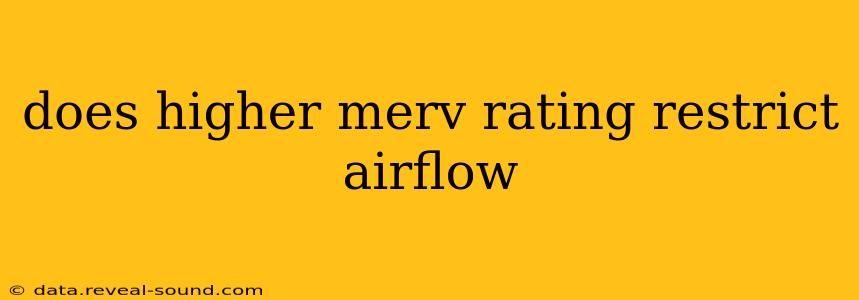Does a Higher MERV Rating Restrict Airflow?
Yes, a higher MERV rating can restrict airflow, but it's not a simple yes or no answer. The relationship between MERV rating and airflow is complex and depends on several factors. Understanding this relationship is crucial for choosing the right air filter for your HVAC system.
Understanding MERV Ratings:
MERV stands for Minimum Efficiency Reporting Value. It's a rating system that measures the effectiveness of an air filter in capturing airborne particles of different sizes. A higher MERV rating (e.g., MERV 13-16) indicates a filter that captures smaller particles, including dust mites, pollen, pet dander, and even some mold spores and bacteria, more effectively than a lower MERV rating (e.g., MERV 8).
The Trade-off: Filtration vs. Airflow
The increased efficiency of higher MERV-rated filters comes at a cost: they restrict airflow more than lower-rated filters. This is because the denser filter media used to capture smaller particles creates more resistance to airflow. This resistance can lead to:
- Reduced airflow: Your HVAC system might struggle to move the same volume of air through the filter, potentially affecting the efficiency of your heating and cooling.
- Increased strain on the system: The system has to work harder to overcome the increased resistance, leading to higher energy consumption and potentially shorter lifespan.
- Increased noise levels: The system may run louder due to the increased strain.
Factors Influencing Airflow Restriction:
Several factors interact to determine the actual impact of a higher MERV rating on airflow:
- Filter type and design: Different filter designs and media types affect airflow restriction even at the same MERV rating.
- HVAC system capacity: A larger, more powerful system will experience less airflow restriction than a smaller system with the same filter.
- Filter cleanliness: A clogged filter, regardless of its MERV rating, significantly restricts airflow. Regular filter replacement is crucial.
- Ductwork design: Restricted or poorly designed ductwork can exacerbate the airflow issues caused by higher MERV filters.
What MERV Rating Should I Choose?
The ideal MERV rating depends on your specific needs and HVAC system capabilities. Factors to consider include:
- Indoor air quality needs: If you have allergies, asthma, or other sensitivities, a higher MERV rating might be beneficial, despite the potential airflow reduction.
- HVAC system capacity: Consult your HVAC system's specifications or a qualified technician to determine the highest MERV rating your system can handle without significant performance issues.
- Maintenance schedule: Higher MERV filters require more frequent changes due to faster clogging.
Can I use a higher MERV filter in my system?
You should consult your HVAC system's manual or a qualified HVAC technician before upgrading to a higher MERV filter. Using a filter with a MERV rating that is too high for your system can cause serious damage.
Will a higher MERV filter always reduce airflow?
While it is common, not all higher MERV filters will reduce airflow. Some manufacturers use advanced filter media and designs that minimize airflow restriction while still maintaining high efficiency.
How often should I change my higher MERV filter?
Higher MERV filters tend to clog more quickly than lower MERV filters, requiring more frequent changes. Check your filter's condition regularly and replace it according to the manufacturer's recommendations or as needed based on visual inspection.
By carefully considering these factors, you can choose a MERV rating that balances effective air filtration with acceptable airflow for your specific situation. Remember, consulting an HVAC professional is always recommended when making significant changes to your air filtration system.
